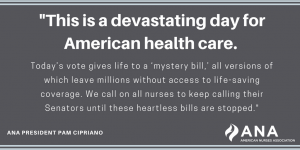
“Skinny” repeal is all the rage in Washington these days, as Senators look to a bill that would undo one of “Obamacare’s” least popular provisions: the individual mandate, which requires all Americans to carry health insurance or face a stiff tax penalty.
In theory, eliminating this mandate might sound like a pretty good deal. So why are some calling the “skinny” repeal the “sham” repeal?
In short, because the skinny/sham repeal would destroy the individual health insurance market. Keep in mind that the skinny/sham repeal eliminates the individual mandate without eliminating the requirement for insurers to cover preexisting conditions, which happens to be one of the most popular provisions of the Affordable Care Act (ACA).
Imagine: you know that insurers have to cover everything the moment you purchase health insurance. If you are a smart consumer, what do you do?
If you answered “not carry health insurance until I get sick or injured,” you win, and the insurance markets lose. This is similar to the way COBRA works; you wait until you get sick to use it, because it will cover everything the moment you take it out. That’s one of the reasons COBRA is so expensive.
The net effect of repealing the individual mandate? Insurers lose money hand over fist and choose to either leave the individual market or go out of business. That’s why the Congressional Budget Office (CBO) has already estimated that simply cutting the individual mandate will cost 15 million Americans their health insurance coverage.
This is why the preexisting condition exclusion and the individual mandate go hand in hand. You can’t have full coverage of all preexisting conditions without the individual mandate. To think otherwise is simply misguided, and to try and pass it into law for the sake of political expediency is simply alarming.

